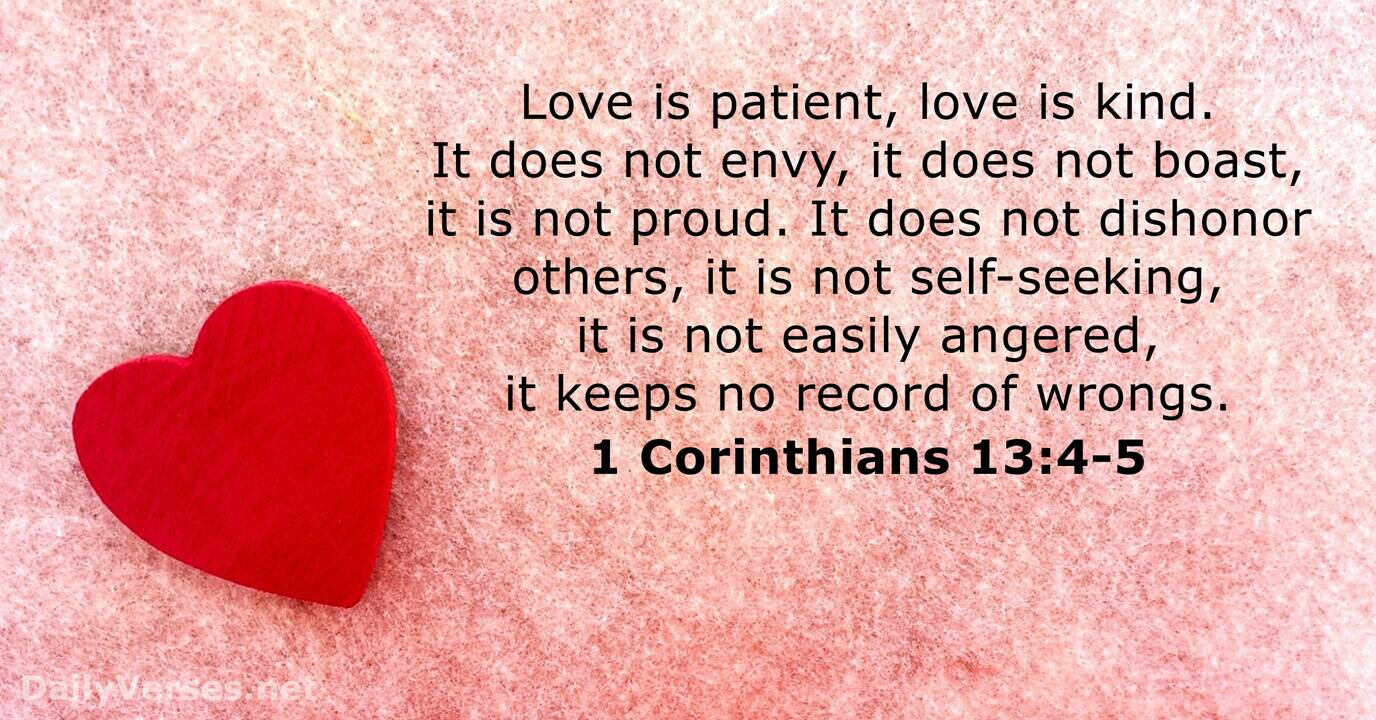What Does Love Look Like?

Our recent studies in the writings of Paul to those who lived in Corinth have shown us that the folks there had invented all sorts of new ways to sin. All of the evil “Corinthian deeds” and all of their perversion of the spiritual gifts provided Paul the launching pad he needed to write this amazing 13th chapter of his first letter to them. The Holy Spirit Himself inspired every word in scripture as they were each recorded by human authors.
Paul closed chapter 12 with verse 31 which reads: “…but earnestly desire the greater gifts and I show you a still more excellent way…”. This verse pours directly into what we have come to call “The Love Chapter” of scripture. Paul argues his “love” case against the way these folks have made life all about themselves and their spiritual gifts. They had forgotten that the gifts come from The Giver Himself. They were distributed to believers in order to edify and unify the church and glorify the Lord.
The word love appears nine times in these thirteen verses of chapter thirteen. In every case, the Greek word that is translated “love” is “agape” which is the precious love of God Himself for us. It is not friend kind of love, even though He has chosen us as friends. It is not the brotherly kind of love, even though Paul writes in Romans that we are adopted into the family of God and become “joint heirs” with Christ as sons and daughters of The Most High God. It is not the sexual expression of love, even though God began the world with one man and one woman and commanded them to multiply and fill the earth and subdue it. Agape love is the unconditional relationship God desires to have with all of His children.
As we study how to love our neighbors in this unit of lessons, we will explore several perspectives from several different locations in scripture. Last week, we looked at the story of the Good Samaritan to gain perspective on being a neighbor who cares for those in our sphere of influence. This week, we see how Paul describes the beauty of love for one another.
In verses 1-3, Paul identifies several of the spiritual gifts, many of which were being abused and inflated in importance rather than being used for the growth of the church as God had intended for them. The gift is listed. Paul returns with his argument that love should be the motive behind the use of every gift: speaking in tongues, prophecy, knowledge, faith, and benevolence. Without the present evidence of love as a motive, each of these gifts are wasted like valuable perfume.
In verses 4-7, Paul provides specific descriptions of agape love. Love is patient, kind, not jealous, not braggadocios, not arrogant, not acting unbecoming, never seeks its own, not provoked, passes over wrong sufferings, distances itself from unrighteousness, rejoices in the truth, bears all things, believes all things, hopes all things, endures all things. Love never fails. Gifts will come and go but this love endures forever. Even the spiritual gifts are serviceable on earth but will not be needed in heaven. We will live forever in the presence of Love Himself.
When we enter into the presence of Love, we will know as we have been known. Paul concludes by saying that all of the gifts can be placed into three profound categories: Faith, Hope and Love. The more excellent way of the final verse in chapter 12 is the only gift that truly remains: Love! Love is the greatest gift.
When Jesus was asked about the greatest commandments in Matthew 22, He answered that they all fall under two categories: Love God. Love your neighbor. On these two hang ALL the law and all the prophecy. They complement each other as they reflect the priority of abundant life on earth and eternal life in heaven.
Love is the more excellent way. Not just ANY love, but “agape” love that seeks first the worship of God and provides for the welfare of our neighbors. What if…just think of this…what IF we loved that way?





Login To Leave Comment